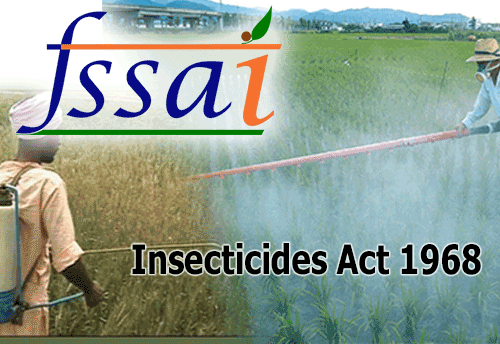FSSAI seeks views on Draft Regulation related to removal of pesticides banned as per Insecticides Act, 1968
Updated: May 03, 2017 09:57:34am

FSSAI seeks views on Draft Regulation related to removal of pesticides banned as per Insecticides Act, 1968
New Delhi, May 3 (KNN) The Food Safety and Standard Authority of India (FSSAI) has sought views from stakeholders on Draft FSS (Contaminants, Toxins and Residues) Amendment Regulation 2017 related to removal of pesticides banned as per Insecticides Act, 1968.
The Insecticides Act regulate import, manufacture, sale, transport, distribution and use of insecticides to prevent risk to human beings or animals.
According to the draft, the amended regulations may be called the Food Safety and Standards (Contaminants, toxins and Residues) Amendment Regulations, 2017. They shall come into force on the date of their final publication in the Official Gazette.
The draft gives mentions 19 insecticides that are banned as per Insecticides Act, 1968. These include – Aldicarb; Aldrin, dieldrin; D.D.T (Withdrawn for use in agriculture); Diazinon (Banned for use in agriculture except for household use); Fenitrothion (Banned for use in agriculture except for locust control in scheduled dessert area and public health); Fenthion (Banned in agriculture except for locust control, household and public health); Methyl Parathion 50 per cent and more.
Further, the regulation 2.3 of Food Safety and Standards (Contaminants, Toxins and Residues) Regulations, 2011, highlights the restrictions or limits on the use of insecticides.
The Draft Regulation has modified / omitted the limits on certain insecticides for usage including that of Aldrin, dieldrin; D.D.T.; Chlordane; Diazinon etc.
The views have been sought by FSAAI by May 15, 2017.
Indian crop protection industry is largely dominated by insecticides which form about 65% of share of the industry. Other segments like herbicides, fungicides and other (rodenticides/ nematocides) form 16%, 15% and 4%, respectively. (KNN Bureau)












